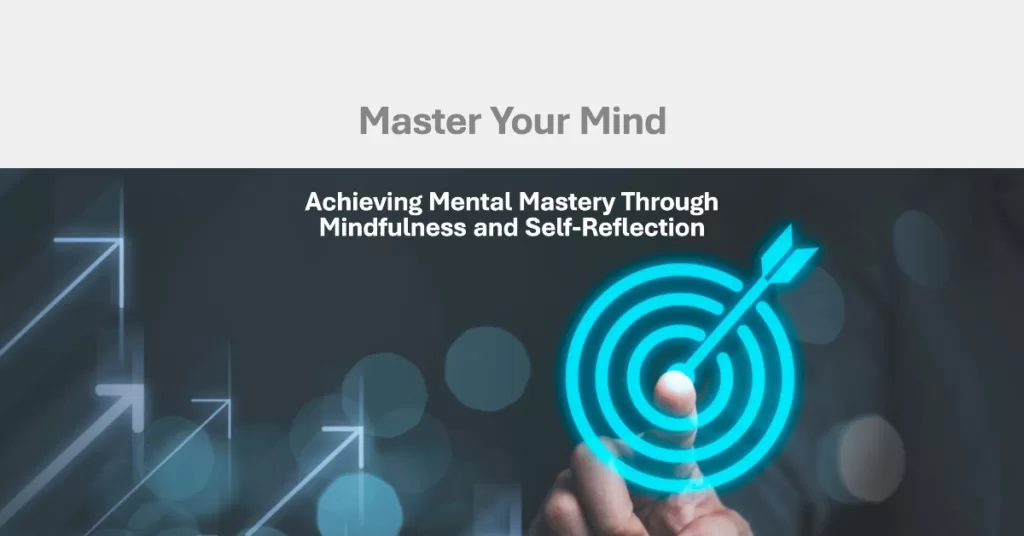Imagine being in a sailboat, out on the open ocean. The wind is strong, and the waves are high, but you’re in control of the boat. You know how to navigate through the stormy waters and reach your destination safely. Now, imagine that your mind is that sailboat, and life’s challenges are like the rough seas. To achieve mental mastery means to be able to steer your mind in any direction you choose despite the external conditions.
As a human being, you have infinite potential for growth and learning. However, without mastering your mind, this potential remains untapped. Mental mastery is about gaining control over your thoughts and emotions so that you can make rational decisions even when things get tough. In this article, we’ll explore some practical tips on how to achieve mental mastery so that you can unlock your full potential and live a more fulfilling life.
Table of Contents
Key Takeaways
- Developing self-awareness through mindfulness is crucial for achieving mental mastery.
- Practicing gratitude, visualization, and surrounding oneself with positive influences can help cultivate a positive mindset.
- Managing negative thoughts and emotions involves mindfulness, positive affirmations, and seeking professional help if needed.
- Consistently working on mental mastery through daily habits like meditation and journaling can lead to improved mood, productivity, decision-making, and creativity.
Understand the Importance of Mental Mastery
You can’t climb the mountain of mental mastery without understanding why it’s so important. Mental mastery is crucial because it enables you to take control of your thoughts, emotions, and actions. When you have mental mastery, you become more resilient in the face of challenges and setbacks. You’re able to maintain a positive mindset even when things aren’t going your way.
In addition, mental mastery helps you to achieve your goals by providing clarity and focus. Without mental clarity, it’s easy to get distracted or overwhelmed by competing priorities. By mastering your thoughts and emotions, you can stay focused on what matters most and avoid wasting time on unimportant tasks.
Moreover, mental mastery leads to greater self-awareness and personal growth. As you develop an understanding of your thought patterns and emotional triggers, you gain insight into how to improve yourself. This awareness allows for continuous improvement in all areas of life.
Achieving mental mastery has far-reaching benefits beyond just personal development. It can positively impact relationships with others as well as professional success. Employers value individuals who possess strong emotional intelligence and the ability to remain calm under pressure.
Understanding the importance of mental mastery is essential if you want to attain this level of self-control over thoughts and emotions. It enables focus on goals while increasing resilience in the face of difficulties that arise along the way leading not only personal growth but also success in work-life balance too!
Develop Self-Awareness
By simply paying attention to your thoughts and emotions, you can start developing self-awareness and gain deeper insights into yourself. It involves being present in the moment and observing your mental processes without judgment. The more aware you become of your thoughts, feelings, and behaviors, the better equipped you are to manage them effectively.
Self-awareness is a crucial skill for achieving mental mastery because it helps you identify patterns of thought or behavior that may be holding you back. For example, if you notice that you tend to get anxious in certain situations or have a negative self-talk pattern when faced with a challenge, you can use this awareness to work on changing those habits. Awareness allows us to see our blind spots and recognize where we need to put in the effort toward self-improvement.
Practicing mindfulness is an effective way to develop self-awareness. Mindfulness means paying attention deliberately and non-judgmentally to whatever arises in the present moment. This practice helps us acknowledge our experiences as they happen instead of getting caught up in automatic reactions or habitual responses. By cultivating greater awareness through mindfulness exercises like meditation or body scans, we can gain insight into our own thought processes.
Ultimately, developing self-awareness is about taking responsibility for your own growth and wellbeing. When we understand ourselves better, we can make conscious choices that align with our values and goals rather than reacting impulsively out of habit or emotion. By practicing mindfulness regularly and becoming more observant of our thoughts and emotions, we can achieve greater mental clarity and freedom from limiting beliefs that hold us back from reaching our full potential.
Manage Negative Thoughts and Emotions

When it comes to managing negative thoughts and emotions, there are several techniques you can use. First, practice mindfulness by being present in the moment and observing your thoughts without judgment. Secondly, use positive affirmations to counteract negative self-talk and boost your confidence. And finally, don’t hesitate to seek professional help if needed – a therapist or counselor can offer guidance on how to effectively manage difficult emotions and improve your mental wellbeing. By incorporating these strategies into your daily routine, you’ll be better equipped to handle whatever challenges come your way.
Practice Mindfulness
Focusing on the present moment through mindfulness can enhance mental clarity and reduce stress. Mindfulness is a practice that involves paying attention to the present moment without judgment. You can try it by sitting in a quiet place, closing your eyes, and bringing awareness to your breath. As you inhale and exhale, focus your attention on the sensation of air moving in and out of your body. If thoughts arise, simply acknowledge them without getting caught up in them, and then bring your attention back to your breath.
Practicing mindfulness regularly can help you become more aware of automatic thought patterns that may be contributing to negative emotions or stress. By noticing these patterns as they arise, you have the opportunity to respond differently than you might have in the past. In addition to improving mental clarity and reducing stress, cultivating mindfulness can also lead to increased self-awareness, better decision-making skills, and an overall sense of wellbeing. So take a few minutes each day to focus on the present moment through mindfulness – it’s a simple yet powerful tool for achieving mental mastery.
Use Positive Affirmations
Feeling down? Try using positive affirmations to boost your mood and confidence! Positive affirmations are simple statements that you can repeat to yourself daily, which focus on positivity and self-belief. They have the power to change your mindset and help you achieve mental mastery.
To use positive affirmations effectively, start by identifying the negative thoughts or beliefs that hold you back. Then, create a list of positive affirmations that directly counteract those negative thoughts. For example, if you struggle with low self-esteem, your affirmation could be “I am confident and capable in everything I do”. Repeat these affirmations daily, preferably in front of a mirror or during a quiet moment alone. With time and consistency, they will become ingrained in your subconscious mind and influence how you perceive yourself and the world around you.
Using positive affirmations is not just about changing your mindset – it’s about taking control of your thoughts and emotions. By replacing negative self-talk with positive affirmations, you can boost your mood, increase motivation, reduce stress levels, and improve overall wellbeing. Give it a try today – what have you got to lose?
Seek Professional Help if Needed
If you’re struggling to manage your mental health, don’t hesitate to seek professional help – it takes strength and courage to ask for support. While positive affirmations can certainly benefit your mental wellbeing, there may be underlying issues that require the guidance of a trained therapist or counselor.
Here are some reasons why seeking professional help can be beneficial:
- Objective perspective: A therapist is an unbiased third party who can provide an objective perspective on your thoughts and behaviors.
- Expert knowledge: Mental health professionals have extensive training and experience in treating a variety of conditions, so they can offer effective strategies for managing symptoms.
- Confidentiality: You can trust that anything you discuss with a therapist will be kept confidential, providing a safe space for you to share your thoughts and feelings.
- Accountability: With regular appointments, you’ll have someone to hold you accountable for making progress toward your goals.
Remember, there is no shame in seeking professional help – it’s a sign of strength and self-awareness. By taking this step toward mental mastery, you’re investing in yourself and your future wellbeing.
Cultivate a Positive Mindset

If you want to cultivate a positive mindset, there are three key things you should focus on practicing gratitude, visualizing success, and surrounding yourself with positive influences. By taking time each day to reflect on the things you’re grateful for, you can shift your perspective and focus on the positive aspects of your life. Visualizing yourself achieving your goals can also help keep you motivated and focused on what’s important. Finally, surrounding yourself with people who are supportive and uplifting can help reinforce a positive outlook in your own life.
Practice Gratitude
By acknowledging the positive aspects of our lives, we can cultivate a mindset of abundance and contentment, as illustrated by the metaphor of a garden where gratitude serves as the fertilizer for our mental wellbeing. When we practice gratitude regularly, we become more aware of the good things in our lives, no matter how small they may seem at first glance. In turn, this helps us to focus on positivity and abundance rather than lack and scarcity.
Here are three practical ways to incorporate gratitude into your daily routine:
- Start a gratitude journal where you write down 2-3 things you are grateful for each day.
- Take a moment before bed each night to reflect on your day and think about what you are thankful for.
- Express your appreciation to someone who has made a positive impact in your life – whether it’s through a simple thank-you note or a heartfelt conversation over coffee. By practicing these simple habits consistently, you’ll begin to notice a shift in your mindset toward one of positivity and contentment.
Visualize Success
Visualizing success can be a fun and effective way to boost your confidence and motivation toward achieving your goals. When you visualize yourself succeeding in what you want to achieve, you create a clear image of the end goal in your mind. This helps to focus your attention on the outcome you desire, which in turn makes it easier for you to take action toward it.
To effectively visualize success, begin by setting aside time each day to practice this technique. Choose a quiet space where you won’t be disturbed and get comfortable. Close your eyes and imagine yourself doing exactly what it is that you want to achieve, whether that’s landing a new job or starting a successful business. Visualize every detail of this scenario- what are you wearing? What does the environment look like? Who else is there with you? The more detailed your visualization, the more real it will feel and the greater impact it will have on your subconscious mind.
Surround Yourself with Positive Influences
Surrounding yourself with positive influences can be like filling your cup with sunshine, lifting your mood, and boosting your motivation to reach your goals. Surroundings have a significant impact on our thoughts and emotions. Negative influences such as toxic people or environments can drain our energy and hinder our progress. On the other hand, positive influences can help us stay focused, inspired, and motivated.
When you surround yourself with people who uplift you, encourage you, and support you in achieving your goals, it becomes easier to stay on track. You’ll feel more confident in taking risks because you know that even if things don’t go according to plan, you’ll have a safety net of supportive individuals who will help pick you up. Building a network of positive influences may take time, but it’s worth the effort. Seek out mentors or peers who share similar values or aspirations as yours and actively engage in activities that align with these interests. The more positivity we surround ourselves with, the more likely we are to achieve mental mastery over our lives.
Practice Mental and Emotional Discipline
You can attain mental and emotional discipline by maintaining control over your thoughts and feelings, like a skilled surfer navigating waves in the ocean. It’s important to understand that our thoughts and emotions can either work for us or against us. To achieve mastery over them, start by observing your mind and identifying negative thought patterns such as self-doubt or fear. Once you’ve identified these patterns, make a conscious effort to replace them with positive affirmations.
Emotional discipline also involves taking responsibility for your own emotions. Stop blaming others for how you feel; instead, take ownership of your reactions. Practice mindfulness techniques such as deep breathing or meditation to help calm yourself during challenging situations. Additionally, learn to manage stress effectively through exercise or other stress-relieving activities.
Another aspect of mental and emotional discipline is developing resilience. Life is full of ups and downs; it’s how we react to those challenges that determines our level of success. Build up your resilience by viewing setbacks as opportunities for growth rather than failures. Remember that the key to mastering this skill is consistency: practice daily habits that support mental clarity and emotional balance.
Achieving mental and emotional discipline requires dedication and practice but it’s worth it in the end because it leads to greater freedom in life. By learning how to navigate negative thought patterns, taking responsibility for our emotions, managing stress effectively, and building resilience through setbacks we become more empowered individuals who are capable of handling any challenge that comes our way. Keep working at it every day until you find a sense of inner peace and balance within yourself!
Consistently Work on Mental Mastery
To consistently improve your mental state, it’s important to develop daily habits that support a healthy mindset. Mental mastery takes time and effort, but the benefits are worth it. One way to achieve this is by setting aside time each day for mindfulness practices such as meditation or journaling. This allows you to step back from your thoughts and emotions, observe them without criticism or analysis, and gain greater self-awareness.
Another approach to mental mastery is through education. Read books on topics like emotional intelligence, cognitive-behavioral therapy, or neuroscience to better understand how your mind works and gain new insights into how you can optimize your mental health. Attend workshops or take courses on stress management or mindfulness-based therapies to learn practical techniques for managing stress and anxiety.
Surround yourself with people who uplift and inspire you. Friends and family members who share similar values can provide emotional support during difficult times. Seek mentors or coaches who have experience in mental health coaching for guidance when you need it most.
To help evoke an emotional response in the audience, consider using and contemplating a list that shows the benefits of consistent mental mastery practices:
- Improved mood
- Increased productivity
- Better decision-making
- Reduced anxiety
- Greater self-awareness
- Enhanced creativity
- Deeper relationships
- More meaningful life experiences
- Increased resilience
Remember that consistent effort is key when working toward mental mastery. By prioritizing habits that promote a healthy mindset, educating yourself on relevant topics, and surrounding yourself with supportive people – you’ll be well on your way toward achieving true freedom in all aspects of your life!




